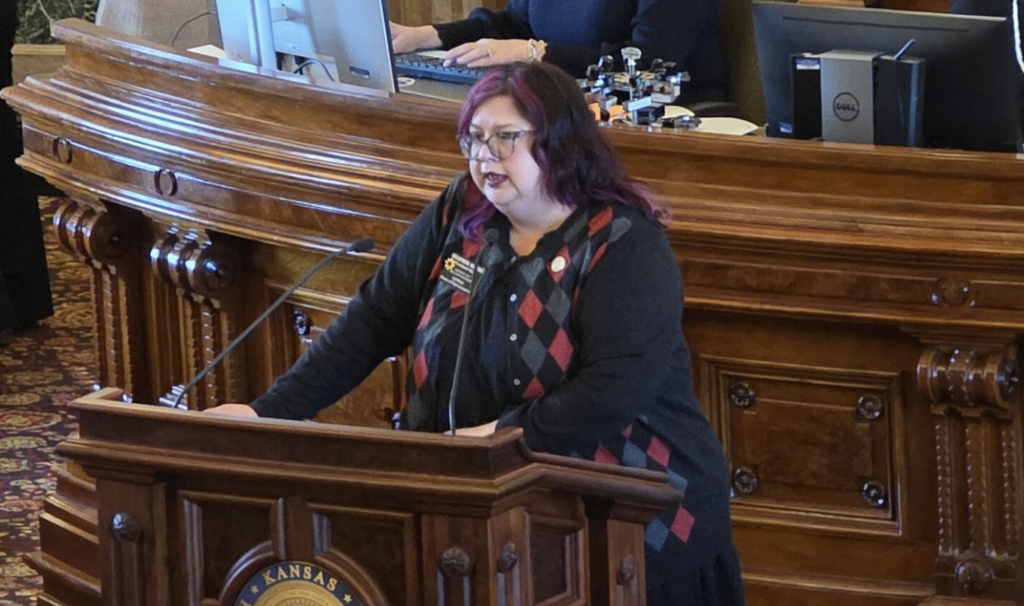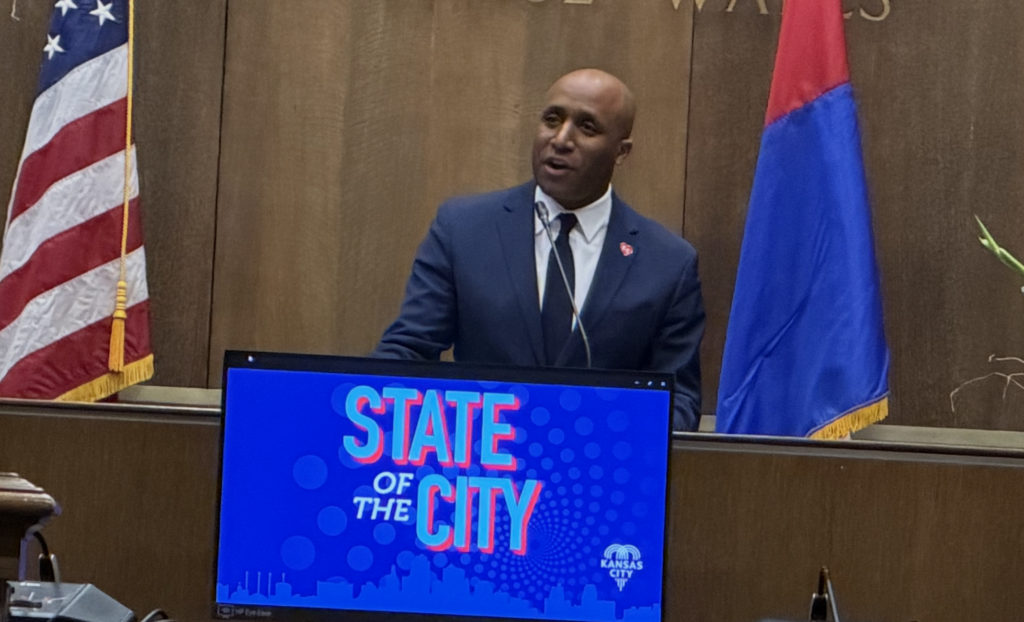Zuckerberg’s conservative pivot fogs our understanding of censorship

Facebook and other social media platforms play such an important role in society that owners such as Mark Zuckerberg wield tremendous power. (Sherman Smith/Kansas Reflector)
For more than two decades, I have taught journalism students — ranging from high school freshmen to university seniors — a specific definition of censorship. I don’t remember the source: a textbook, a dictionary, a lecture, a podcast or my academic notes.
Here’s the definition that my students hope to memorize for their multiple-choice exams: “Censorship is legally designated authority of what is said and what is written.”
(When I Googled the exact phrase today, my top result was a set of online flash cards that one of my students created to study for my exam. Like some new-age theology, the search led me right back to myself.)
I bring up this definition not to extend my classroom even further into my columns. Instead, I bring it up because two words of that definition have become increasingly confusing to my students — and I expect this semester will be the most confusing of all. I also expect our word choices surrounding free expression and censorship have been muddled for Kansans of all ages.
The words in question: “legally designated.”
Decades ago, most institutions that controlled expression found that power through law. Most often, it was the government that censored — or tried to. Sometimes, religious authorities partnered with governments. Authoritarian governments stifled protests. School boards pulled books from library shelves. Broadcasting regulators limited profanity.
All of these legally sanctioned forms of censorship still happen today, of course.
For instance, the school board for Derby Public Schools heard backlash from its teachers this week after four board members voted down a recommended social studies curriculum. A portion of one textbook described the first term of President Donald Trump in a way that seemed unfair to board members. Another red flag, to some of these board members, was anti-racist writing on a blog and pro-diversity language on the website for the publishing company.
One Derby teacher said during his presentation that they would have never arrived at the Trump portion during their courses due to time constraints. The blog post is buried on the corporate website. Nevertheless, the scarlet letter had been found. Vote it down.
Let’s call this Derby controversy the old-fashioned form of censorship, however corrosive it is. Derby students will not read the most excellent textbooks available, according to their own veteran teachers who spend months deliberating on the textbook options. It’s an old standard from the Greatest Hits of Censorship: The political whims of elected officials control what students learn.
In addition to this form of censorship, my students, along with many other Americans, see censorship more broadly now — and there’s a logical reason why.
Today, if a corporation discovers and removes false and damaging statements on its platform, people say it is censoring. See the rightwing furor over YouTube tamping down COVID-19 disinformation.
Today, if a corporation regains its wits and retracts something lewd and offensive, people say it is censoring. See the complaints last month about a video game publisher who made an update that prevented players hoping to “look up at their character’s panties.”
Expanding the definition of censorship in this way distorts the word entirely.
Under this definition, the newspapers of the 20th century were perhaps the biggest censors in history. Those overreaching editors actually vetted the letters to the editor that they published! Consider all of the unhinged mudslinging that readers could have enjoyed each morning with their coffee if editors stopped that pesky moderating.
Last week, you might have heard Mark Zuckerberg, the CEO of Meta, explain how Facebook is “going to dramatically reduce the amount of censorship on our platforms.”
He also announced that fact-checking would move from California to Texas. Finally, the moderation will “adopt a system like (social media platform) X has of community notes.”
On one hand, this cluster of announcements looks like a craven cave-in to MAGA-ism on the eve of Trump’s second inauguration.
On the other hand, Zuckerberg performs a free expression magic trick. He both grants his platform the power to censor and the responsibility to do less of it. If we are to believe that censorship is a government action, his word choice (nine instances of a form of “censor” in 900 words) is significant. He crowns his company as a nation state with the power to censor. And he is crowned as the policy-writing king.
It’s a dizzying swerve for Zuckerberg. As technology columnist Kevin Roose of the New York Times said, Zuckerberg used “this word ‘censorship’ that he has avoided studiously for years in describing the content moderation work that every social network, including all of Meta’s social networks, do as a matter of business.”
This corporate change by Zuckerberg feeds conservative appetites. Since the rise of MAGA politics, public figures on the right have hoped to unbridle social media and other expression. Dispose of these standards, fact-checking and moderation, they say. Behold corporate un-censorship.
Elon Musk signaled his intention to allow conservative speech to flourish on Twitter from the time that he began negotiating its purchase through today, when the platform’s lack of content moderation has created a cesspool of reposts, name-calling and racism.
Josh Hawley, the Republican senator from Missouri, published a book titled “The Tyranny of Big Tech” in 2021. It’s promoted with the threat that “Our First Amendment rights are a keystroke away from being extinguished.”
In hearing these three prominent voices join a conservative chorus about censorship, our American popular definition has shifted. We previously saw censorship as government intervention. Now corporations are just as likely to be censors.
Combine these two things: the historical and continuing penchant of conservatives to use old-fashioned censorship, along with uncorking social media so that conservatives can say what they want. Like a highway construction crew with an agenda, they have closed down the left lane through traditional censorship and opened a few additional lanes on the right through social media.
Earlier I said that this definitional confusion about censorship — whether it is a government action or a corporate action — is logical. That logical reason is power.
In the pre-internet past, governments and religions flexed their ability to censor because of their power. Dispatch the police to burn the local presses. Intimidate the editor with mob rule. Exile the author for his heresy.
Along with that of other technology oligarchs, Zuckerberg’s power rivals these institutions. By dialing the speech in one direction or another — even a small bit — he creates profound effects. He conceded as much during his Jan. 7 statement, saying that “censoring 1% of posts” can create significant mistakes. By unbridling the expression of Facebook users, he is likely to swing the platform much more than 1%.
Is it semantic to draw this line between government censorship and corporate censorship? I don’t think so.
After all, we can appeal government censorship to a legal system guided by the U.S. Constitution. Corporate censorship relies on often arbitrary guidelines created by owners and executives.
As Zuckerberg signaled this week, those policies shift in the political wind.
Eric Thomas teaches visual journalism and photojournalism at the William Allen White School of Journalism and Mass Communication at the University of Kansas in Lawrence. Through its opinion section, Kansas Reflector works to amplify the voices of people who are affected by public policies or excluded from public debate. Find information, including how to submit your own commentary, here.
Kansas Reflector is part of States Newsroom, a nonprofit news network supported by grants and a coalition of donors as a 501c(3) public charity. Kansas Reflector maintains editorial independence. Contact Editor Sherman Smith for questions: info@kansasreflector.com.




